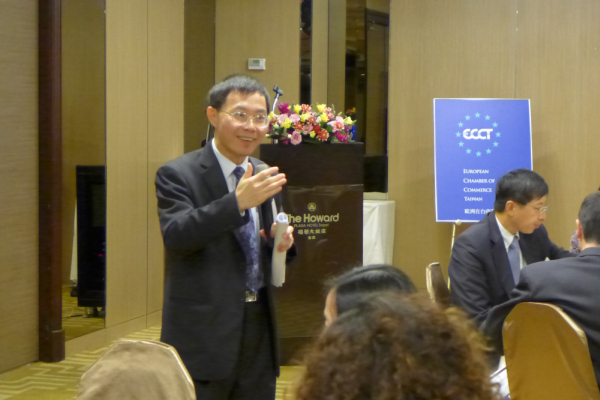Lunch with the Ministry of Labour

According to Hao, the MoL will strive to maintain policies on autonomy, fairness and development to enhance autonomous labour-management relations, create a fair and just labour environment and establish a labour market with developmental potential. It is the new ministry's goal to give the people of Taiwan a safe, competitive and dignified working environment, he said.
Hao noted that it takes time to introduce and implement reforms in Taiwan. For example, he said it took more than 20 years for the CLA to be upgraded to a ministry. Moreover, changes to legislation have to go through a complex and time-consuming processes and therefore take much longer than changes that merely require administrative approval.
Labour reforms have to take into account the numerous challenges facing Taiwan. The most serious of these are related dealing with Taiwan's rapidly changing demographics (low birth rate and aging society), inadequate education to meet the economy's real needs and increasing the overall labour participation rate. For the MoL specifically, the overarching challenge is to create a regulatory system that is flexible enough to meet the needs of labour market while safeguarding the rights of the work force. Striking the right balance is not easy and no policy is likely to satisfy all stakeholders but the MoL has drawn reference from regulations in many countries in drafting its regulations.
A case in point, which was discussed at length during the lunch, is the issue of dispatched workers, whose contracts do not give them the same rights and benefits as full-time employees. To protect the interests of employees the MoL wants to restrict the practice of companies employing dispatched workers to no more than 3% of a company's total workforce and to limit dispatched contracts to no longer than one year. These restrictions are designed to protect employees and the prevent abuse of the dispatch labour system on the part of employers. However, one guest pointed out that the headcounts of local operations of foreign-owned enterprises is often decided by foreign headquarters and therefore there is a need for greater flexibility for local operations to meet their headcount needs.
Striking the right balance between industry needs and labour protection is tricky because there are no definitive international standards or best practices for local authorities to follow. They the local authorities looked at many countries and took into account the positions of multiple stakeholders. The restrictions were chosen after much deliberation. Hao noted that this included reviewing the ECCT's position papers as well as opinions from other industry associations.
Nevertheless, Hao said that regulations governing dispatch workers and others under the proposed Amendments to the Labour Standards Law of concern to ECCT members, may still be revised if need be. He therefore welcomed the input and ideas for improvements to any of Taiwan's labour laws from the ECCT and said he would be more than happy to discuss any issues of interest further with members.
Looking ahead, the MoL will be working on amendments to the Labour Standards Act, Occupational Safety and Health Act, and labour-management dispute settlement system.
Labour Standards Act
In view of the importance of work-life balance that has dominated the international labour movement, the MoL is reviewing the possibility of reducing the statutory level of "normal" working hours. The ministry will be meeting with labour and management organizations this year to discuss working hour adjustments and related measures, and are looking to complete amendments on working hours in the Labour Standards Act in 2015.
Occupational Safety and Health Act
The Labour Safety and Health Act was revised and promulgated in July 2013 to become the Occupational Safety and Health Act. The new act contains some significant revisions, including expanding the scope of protection (from 6.7 million people to 10.67 million people), establishing a management mechanism at the source for machinery, facilities, and chemicals, establishing an occupational disease prevention system, revising maternal protection for female labourers, strengthening monitoring mechanisms for the safety assessment of regular processes in high risk businesses and increasing the penalties for the violations thereof, and fostering occupational safety and health culture and development in related industries. Within the next year, the ministry will continue to revise supplementary regulations on the management of machinery, facilities, tools, and chemicals at the source, the prevention of occupational injuries and diseases, the protection of physical and mental wellbeing of labourers, monitoring and management of high risk businesses, and fostering a safe and healthy culture.
Labour-management dispute settlement system
The ministry is looking to establish a quick way to settle disputes below a specific amount using arbitration.
